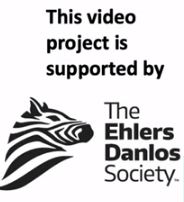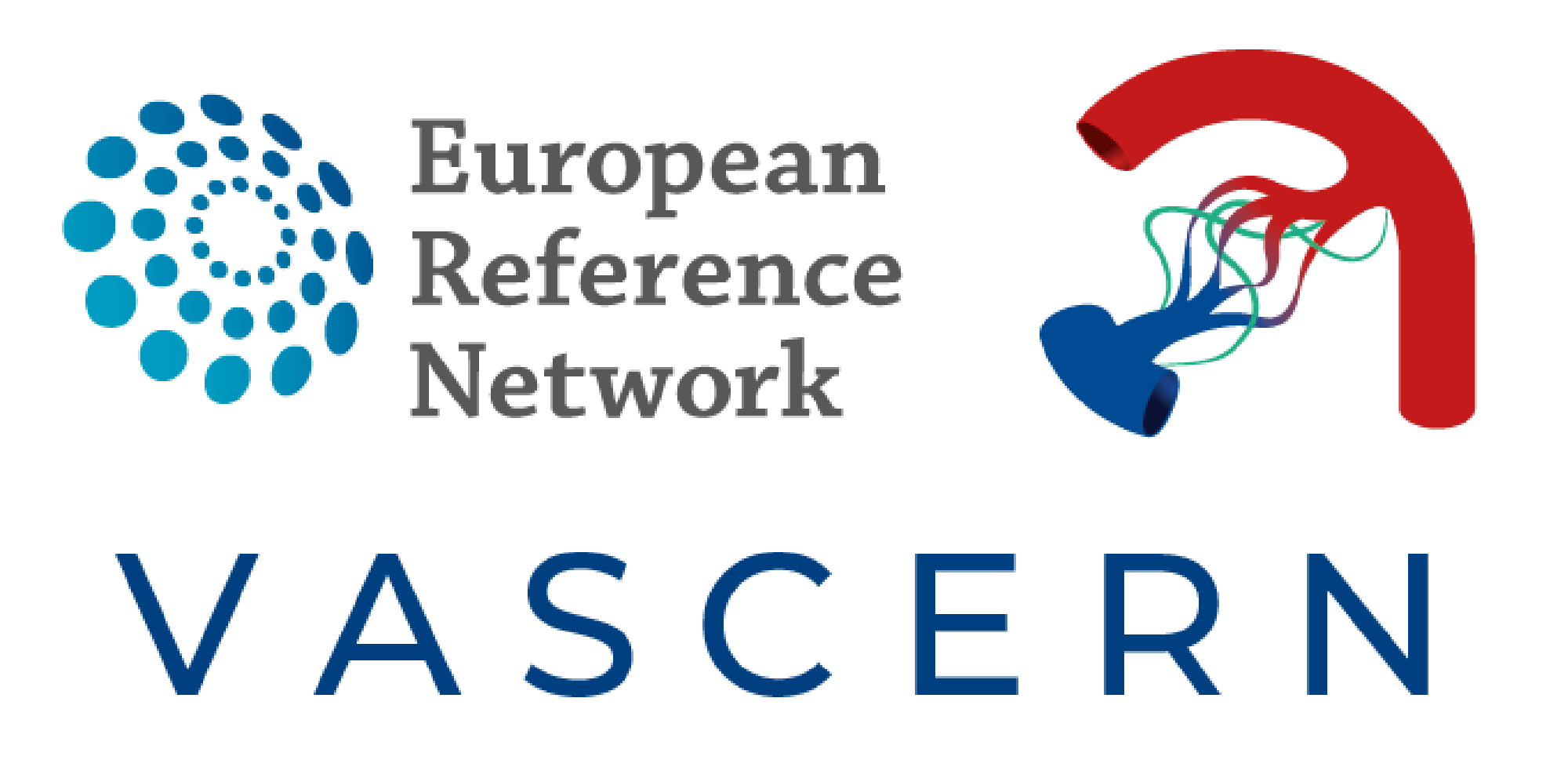

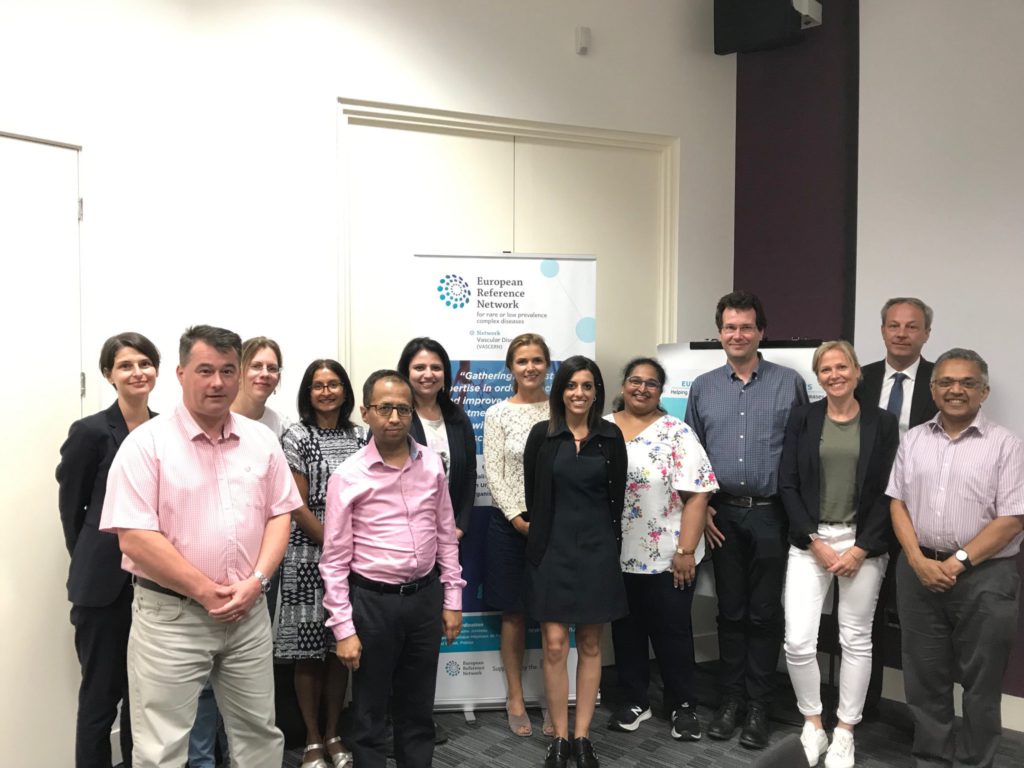
The Medium-Sized Arteries Working Group (MSA WG) held a brief face-to-face meeting in London on the morning of July 1st, 2019. Chaired by Dr. Leema Robert, the meeting was attended by healthcare representatives from Belgium, France, Italy and The Netherlands.
Items discussed were the Marfan Foundation statement on celiprolol and the possibility of making a VASCERN statement in response, the progress of the vEDS RaDiCo registry (part of the VASCERN registry project), the evaluation of the patient pathway for vEDS and the new call for HCP members.
The face-to-face meeting was then followed by a study day for clinicians on various topics related to vascular Ehlers-Danlos syndrome (vEDS), where many interesting talks were presented. We are happy to report that these presentations were filmed and have been made into 16 Pills of Knowledge (PoK) videos!
Please note that the language of these PoKs is English and that they are mainly intended for medical students, trainees or other healthcare professionals as they contain complex and highly specific medical and scientific terminology.
The PoKs have been organised into the following topics:
Introduction and brief overview of VASCERN / MSA
1. Structure of the Medium-Sized Arteries Working Group (MSA WG) in VASCERN by Dr. Leema Robert, consultant clinical geneticist, Guys and St. Thomas Hospital , London, UK.
Dr. Leema Robert, MSA WG Chair, presents the goals, actions and structure of VASCERN as well as the accomplished and ongoing work of the MSA WG, that currently covers vascular Ehlers-Danlos syndrome.
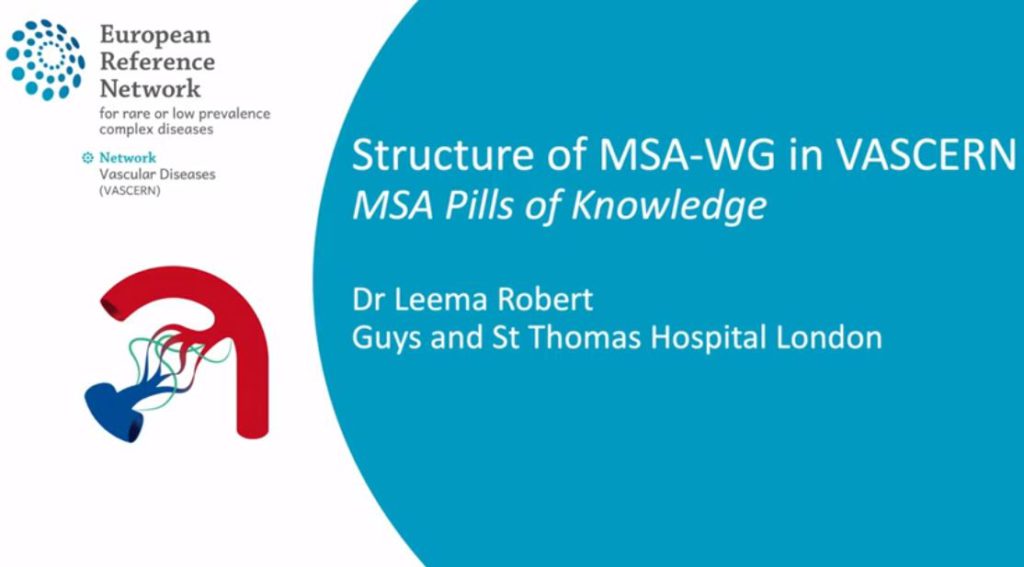
Diagnosis and management of vEDS
2. Vascular Ehlers-Danlos syndrome: Introduction and new criteria by Dr. Fransiska Malfait, clinical geneticist, Center of Medical Genetics, Ghent University Hospital, Ghent, Belgium.
This video gives an introduction to vascular Ehlers-Danlos syndrome (vEDS) and presents the major and minor clinical criteria for vEDS from the 2017 International Classification for all types of Ehlers-Danlos syndromes published in the American Journal of Human Genetics. The Villefranche Nosology is also mentioned.
3. Genetics of vascular Ehlers-Danlos syndrome (vEDS): Part 1 – Pathogenic variants in COL3A1 by Dr. Ingrid van de Laar, Clinical geneticist, Erasmus Medical Center, Rotterdam, The Netherlands.
The Genetics of vascular Ehlers-Danlos syndrome (vEDS) are explored in three videos. In this video, part 1 of 3 – Pathogenic variants in COL3A1 – The gene COL3A1, which is found to be mutated in most patients with vEDS, is presented and explanations are given on how it encodes an important component of the collagen fibers. The types of molecular genetic testing for variants in the COL3A1 gene are also briefly covered.
4. Genetics of vascular Ehlers-Danlos syndrome (vEDS): Part 2 – Pathogenic variants in COL3A1: dominant negative effect by Dr. Ingrid van de Laar, Clinical geneticist, Erasmus Medical Center, Rotterdam, The Netherlands.
The Genetics of vascular Ehlers-Danlos syndrome (vEDS) are explored in three videos. In this video, part 2 of 3 – Pathogenic variants in COL3A1: dominant negative effect, the pathogenic variants in the COL3A1 gene that lead to a “dominant negative effect” (i.e. which results in an altered gene product affecting the function of the normal protein) are discussed (i.e. glycine substitutions within the triple helix and splice-site variants, in-frame insertions/deletions/duplications). The genotype/phenotype correlation associated with each type of variant is also introduced.
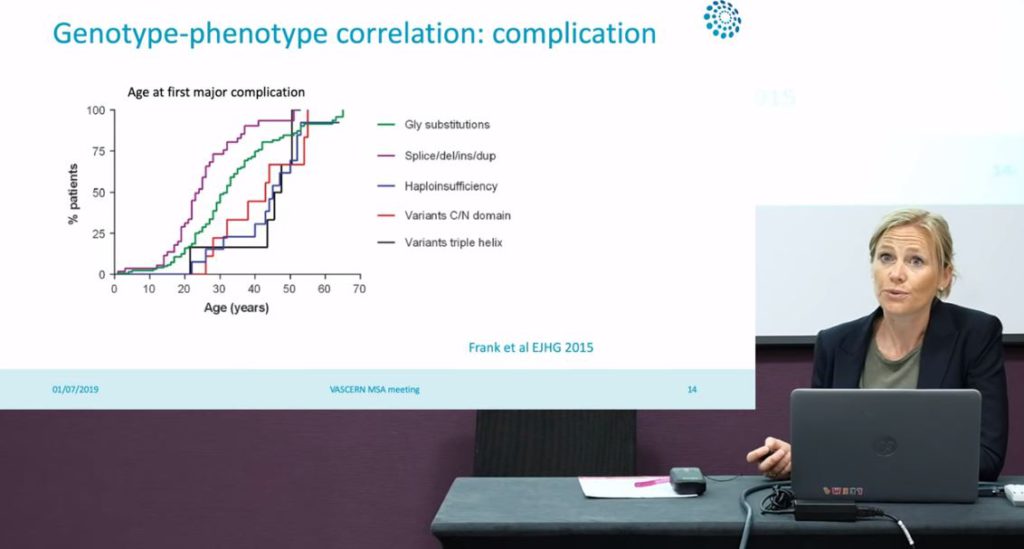
5. Genetics of vascular Ehlers-Danlos syndrome (vEDS): Part 3 – Pathogenic variants in COL3A1 : haplo-insufficiency by Dr. Ingrid van de Laar, Clinical geneticist, Erasmus Medical Center, Rotterdam, The Netherlands.
The Genetics of vascular Ehlers-Danlos syndrome (vEDS) are explored in three videos. In this video, part 3 of 3 – Pathogenic variants in COL3A1: haplo-insufficiency, the pathogenic variants in the COL3A1 gene that lead to haplo-insufficiency (i.e. only half of the protein being formed) are discussed. The genotype/phenotype correlation associated with this type of variants is presented.
6. Clinical Features and Diagnostic criteria of vascular Ehlers-Danlos syndrome (vEDS) – Part 1 by Dr. Michael Frank, Cardiologist, Rare Vascular Disease Reference Centre, Assistance Publique-Hôpitaux de Paris, Hôpital Européen, Georges Pompidou (HEGP), Paris, France.
This video (part 1 of 3) discusses the clinical characteristic features and the diagnostic criteria of vascular Ehlers-Danlos syndrome (vEDS).
7. Natural history and complications of vascular EDS – Part 2 by Dr. Michael Frank, Cardiologist, Rare Vascular Disease Reference Centre, Assistance Publique-Hôpitaux de Paris, Hôpital Européen, Georges Pompidou (HEGP), Paris, France.
This video (part 2 of 3) discusses natural history of vEDS from early childhood until adulthood. The most common complications seen in vEDS patients (e.g. arterial, digestive, obstetric), their frequency and their average age of onset are presented. Prognostic factors are also briefly explored.
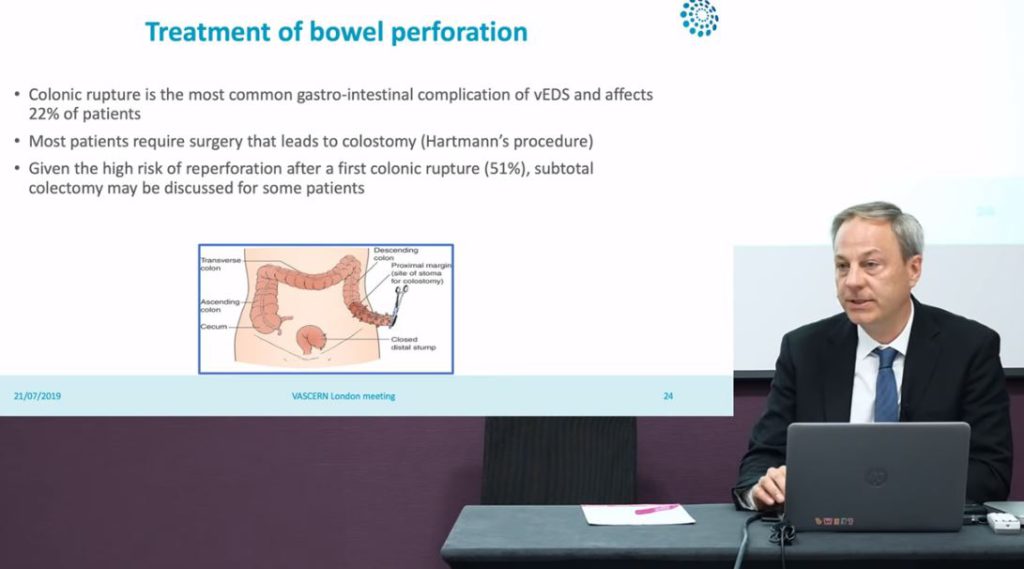
8. Monitoring and Management of vascular Ehlers-Danlos syndrome (vEDS) by Dr. Michael Frank, Cardiologist, Rare Vascular Disease Reference Centre, Assistance Publique-Hôpitaux de Paris, Hôpital Européen, Georges Pompidou (HEGP), Paris, France.
This video (part 3 of 3) discussed the primary objectives of vEDS patient management and monitoring as well as the need for a dedicated multidisciplinary care team that has experience in vEDS. Current medical treatments for vEDS are also presented.
9. Pregnancy in vascular Ehlers-Danlos syndrome (vEDS) – Part 1 by Dr. Leema Robert, consultant clinical geneticist, Guys and St. Thomas Hospital , London, UK.
Dr. Leema Robert, MSA-WG Chair, explores several cases of women with vascular EDS and three population studies in order to make conclusions and recommendations regarding pregnancy in vascular EDS patients. The recent European Society of Cardiology (ESC) guidelines are also briefly mentioned.
10. Pregnancy in vascular Ehlers-Danlos syndrome (vEDS) – Part 2 – Is In Vitro Fertilisation (IVF) safe in vEDS patients? by Dr. Leema Robert, consultant clinical geneticist, Guys and St. Thomas Hospital , London, UK.
Following the video “pregnancy in vascular EDS (vEDS) syndrome”, this video looks at the current literature regarding the question of whether in vitro fertilization is safe in vEDS patients. The possible risks involved with ovarian stimulation as well as the topics of in vitro maturation (IVM) and pre-implantation genetic diagnosis are explored. Recommendations from the VASCERN MSA-WG are given.
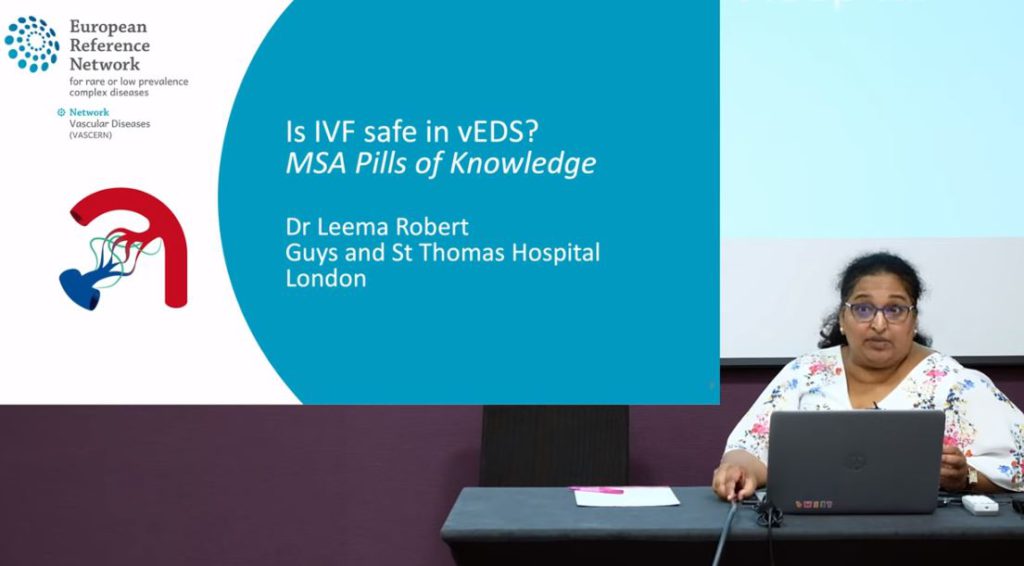
Differential diagnosis for MSA involvement:
11. Arterial fragility in other types of Ehlers Danlos Syndrome: Part 1 – Introduction, Classical Ehlers-Danlos Syndrome (EDS) by Dr. Neeti Ghali (consultant clinical geneticist and cooperating guest from the EDS National Diagnostic Services in London, UK).
Arterial fragility seen in other types of EDS is discussed in three videos. This is part 1 of 3, which examines the clinical and genetic features of classical EDS, including its association with arterial complications in some cases.
12. Arterial fragility in other types of Ehlers Danlos Syndrome: Part 2 – Kyphoscoliotic Ehlers-Danlos Syndrome (EDS) by Dr. Neeti Ghali (consultant clinical geneticist and cooperating guest from the EDS National Diagnostic Services in London, UK).
Arterial fragility seen in other types of EDS is discussed in three videos. This is part 2 of 3, which examines the clinical and genetic features of kyphoscoliotic EDS, which shows phenotypic overlap with both classical and vascular EDS.
13. Arterial fragility in other types of Ehlers Danlos Syndrome: Part 3 – Other rarer types of Ehler-Danlos Syndrome (EDS) by Dr. Neeti Ghali (consultant clinical geneticist and cooperating guest from the EDS National Diagnostic Services in London, UK).
Arterial fragility seen in other types of EDS is discussed in three videos. This is part 3 of 3, which examines periodontal EDS as well as the need for constant revision of gene variant calling in order to reclassify patients’ previous variants of uncertain significance (VUS) to likely pathogenic or pathogenic variants as more cases are discovered and fulfill the criteria for classical EDS.
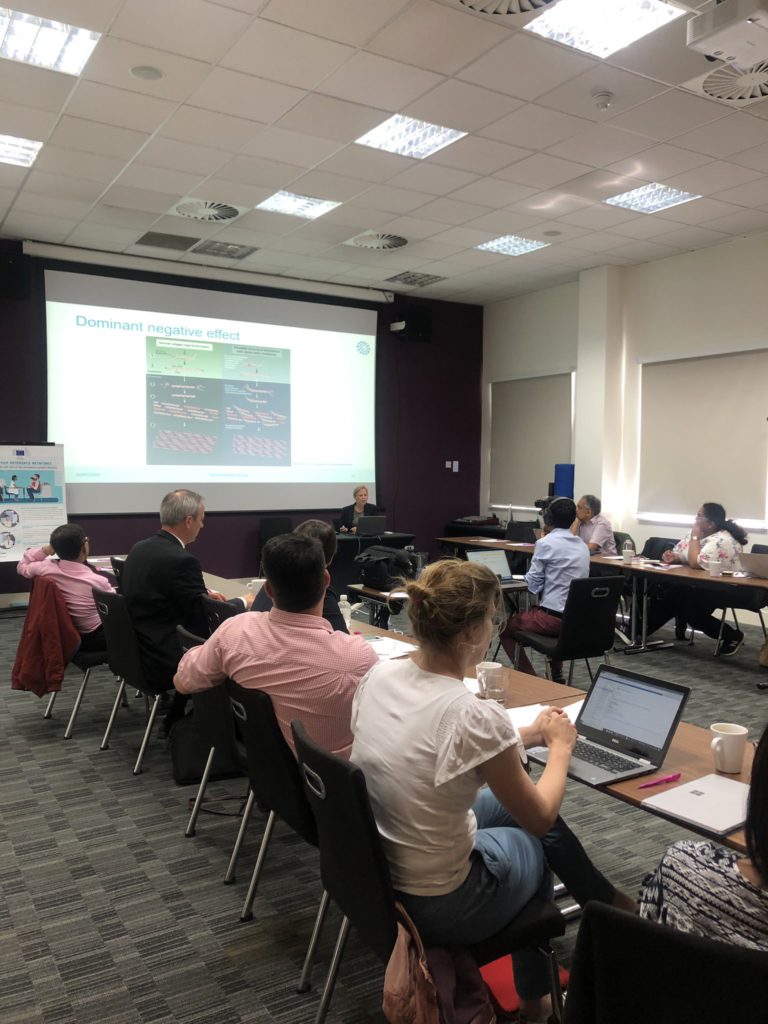
14. Medium sized artery disease in TGF-beta vasculopathies or syndromic aortopathies by Prof Bart Loeys, Clinical Geneticist, Center for Medical Genetics, Antwerp University Hospital, Antwerp, Belgium.
In this video, the various types of TGF-beta vasculopathies or syndromic aortopathies causing medium-sized artery disease are discussed including, among others, Loeys-Dietz syndrome (LDS), Shprintzen-Goldberg syndrome, and arterial tortuosity syndrome. The genes of LDS and the genes of other syndromic aortopathies are examined in regards to their association with arterial involvement.
15. Organisations of services in UK by Dr. Leema Robert, consultant clinical geneticist, Guys and St. Thomas Hospital, London, UK.
Dr. Leema Robert, Chair of the MSA-WG, gives an overview of the vEDS services in the UK and how they are organized. The two genetic services providing pediatric and adult expertise in vEDS in London are presented.
Animal studies in vEDS
16. Overview of animal studies in vEDS by Fransiska Malfait, clinical geneticist, Center of Medical Genetics, Ghent University Hospital, Ghent, Belgium.
This video gives an overview of the animal (mouse) models and pre-clinical studies that have been published for vascular Ehlers-Danlos syndrome and their findings.
Finally, one other presentation was given on the RaDiCo-SEDVasc (The Rare Disease Cohort on Vascular Ehlers-Danlos syndrome) by Dr. Michael Frank.
We would like to thank the Ehlers-Danlos Society for generously co-funding the production of these educational videos along with the co-funding from the Health Programme of the European Union that allowed for this study day to take place. These videos are now available on the VASCERN Youtube channel, here. You can also find them on the VASCERN website here.
